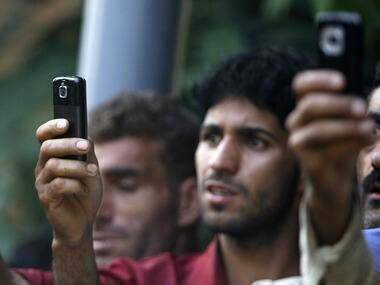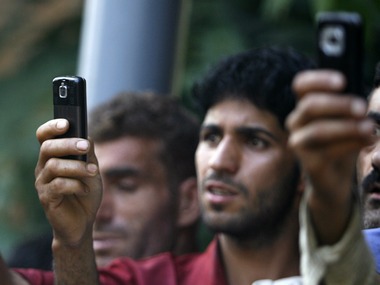The problem with using the same mobile phone number for years is that your data inevitably ends up in the hands of spammers in a country where privacy is a non-issue. So I’ve been a big fan of anything that can minimise calls and text messages selling me everything from escort services to unbelievable deals on credit cards. I know in India even the best technology cannot prevent one or two seductive female voices trying to get me to bite the bait everyday, but a barrage of calls and text messages sends my blood pressure shooting. [caption id=“attachment_223906” align=“alignleft” width=“380” caption=“Reuters”]
 [/caption] A few months after I ported out of Vodafone to what was then Tata Indicom (now Tata Docomo CDMA), the Telecom Regulatory Authority of India (TRAI) finally launched the Telecom Commercial Communications Customer Preference Portal featuring the National Customer Preference Register (NCPR) after many a stutter. Finally, some relief, I thought. Of course, Tata Indicom
managed to mess up my request
, but after I raised a stink, my number reflected on the NCPR and things seemed under control. Until mid-January. Suddenly, out of the blue, my mobile device started beeping and ringing thanks to irritating bulk messages and an unbelievably high number of seductive voices. On a whim I decided to check the
TRAI NCPR website
. To my utter surprise the website revealed I wasn’t on the NCPR database anymore. No, no no! I immediately got in touch with Tata Docomo to find out how this could happen when I had not requested for deactivation. As usual, they were clueless (some things never change). They assured me that I was very much on their list but said they had no idea why I was not on the TRAI NCPR database—perhaps a ‘technical error’ they suggested. They promised to get to the bottom of things, but in a few days they signed me up again. So, like a good Indian customer who shouldn’t expect luxuries like answers, I forgave everyone. But on 26 January, even as India was celebrating its establishment as a Republic and complete divorce from the British monarchy, I was once again forcibly enslaved by spam. I had a sinking feeling in my chest as I checked the TRAI NCPR website and I was right– once again I was off the list. Complained again and Tata Docomo swore they weren’t to blame and promised to get to the bottom of it. After some repeated pushing over the next few days—I was determined to find out what was happening–they finally informed me verbally, that my earlier provider Vodafone was to blame. Seems Vodafone was sneakily getting the number removed from the NCPR database. So, I asked Vodafone. They were quick to deny everything in writing and gave me their version, according to which there was no way they could be up to any mischief. They were being needlessly maligned, they claimed. But then Tata Docomo upped the ante—the company’s Appellate Authority in Mumbai put it in writing, stating: “We would like to inform you that the number 98200XXXXX was registered on NCPR website by us on 19 January 2012. However it was again delisted from NCPR Portal by Vodafone as confirmed by TRAI.” I forwarded the mail to Vodafone and all I’ve heard thus far is deafening silence. I’m still not sure Vodafone is to blame, because unless TRAI tells me what really happened, it’s one operator’s word against another. A screenshot of the status of my number of the TRAI NCPR website however, clearly reveals the number of times it has been added and deleted. And I’m not sure about the policeman’s role in this sordid story either. Repeated e-mails sent to TRAI asking for details on this matter have been ignored. If Vodafone has indeed manipulated the NCPR and tried to harass me because I’ve ported out, then TRAI is equally to blame, considering that they run the NCPR and should have foreseen loopholes that unscrupulous operators might use. In many ways, my problem is an example of the mess that Indian telecom is in— TRAI’s last DND (Do Not Disturb) initiative ended up a joke. Considering what I’ve faced with the NCPR portal, perhaps this one is not far from disaster either - what with operators up to dirty tricks, everyone pointing fingers at each other and a regulator that seems like an ineffective paper tiger that no one really cares about. In the macro picture, also factor in a paralysed government which has tied itself up with corruption-coated toxic red tape and an angry judiciary forced to play policeman to sort out the logjam. Will the customer ever manage to get a decent level of service that he’s paying for from Indian operators and the telecom regulator?
[/caption] A few months after I ported out of Vodafone to what was then Tata Indicom (now Tata Docomo CDMA), the Telecom Regulatory Authority of India (TRAI) finally launched the Telecom Commercial Communications Customer Preference Portal featuring the National Customer Preference Register (NCPR) after many a stutter. Finally, some relief, I thought. Of course, Tata Indicom
managed to mess up my request
, but after I raised a stink, my number reflected on the NCPR and things seemed under control. Until mid-January. Suddenly, out of the blue, my mobile device started beeping and ringing thanks to irritating bulk messages and an unbelievably high number of seductive voices. On a whim I decided to check the
TRAI NCPR website
. To my utter surprise the website revealed I wasn’t on the NCPR database anymore. No, no no! I immediately got in touch with Tata Docomo to find out how this could happen when I had not requested for deactivation. As usual, they were clueless (some things never change). They assured me that I was very much on their list but said they had no idea why I was not on the TRAI NCPR database—perhaps a ‘technical error’ they suggested. They promised to get to the bottom of things, but in a few days they signed me up again. So, like a good Indian customer who shouldn’t expect luxuries like answers, I forgave everyone. But on 26 January, even as India was celebrating its establishment as a Republic and complete divorce from the British monarchy, I was once again forcibly enslaved by spam. I had a sinking feeling in my chest as I checked the TRAI NCPR website and I was right– once again I was off the list. Complained again and Tata Docomo swore they weren’t to blame and promised to get to the bottom of it. After some repeated pushing over the next few days—I was determined to find out what was happening–they finally informed me verbally, that my earlier provider Vodafone was to blame. Seems Vodafone was sneakily getting the number removed from the NCPR database. So, I asked Vodafone. They were quick to deny everything in writing and gave me their version, according to which there was no way they could be up to any mischief. They were being needlessly maligned, they claimed. But then Tata Docomo upped the ante—the company’s Appellate Authority in Mumbai put it in writing, stating: “We would like to inform you that the number 98200XXXXX was registered on NCPR website by us on 19 January 2012. However it was again delisted from NCPR Portal by Vodafone as confirmed by TRAI.” I forwarded the mail to Vodafone and all I’ve heard thus far is deafening silence. I’m still not sure Vodafone is to blame, because unless TRAI tells me what really happened, it’s one operator’s word against another. A screenshot of the status of my number of the TRAI NCPR website however, clearly reveals the number of times it has been added and deleted. And I’m not sure about the policeman’s role in this sordid story either. Repeated e-mails sent to TRAI asking for details on this matter have been ignored. If Vodafone has indeed manipulated the NCPR and tried to harass me because I’ve ported out, then TRAI is equally to blame, considering that they run the NCPR and should have foreseen loopholes that unscrupulous operators might use. In many ways, my problem is an example of the mess that Indian telecom is in— TRAI’s last DND (Do Not Disturb) initiative ended up a joke. Considering what I’ve faced with the NCPR portal, perhaps this one is not far from disaster either - what with operators up to dirty tricks, everyone pointing fingers at each other and a regulator that seems like an ineffective paper tiger that no one really cares about. In the macro picture, also factor in a paralysed government which has tied itself up with corruption-coated toxic red tape and an angry judiciary forced to play policeman to sort out the logjam. Will the customer ever manage to get a decent level of service that he’s paying for from Indian operators and the telecom regulator?
Attention TRAI: Make sure you get portability right
Ivor Soans
• February 24, 2012, 10:43:52 IST
TRAI needs to make sure that customers who choose to port their numbers are not harassed by their old mobile phone operators.
Advertisement
)